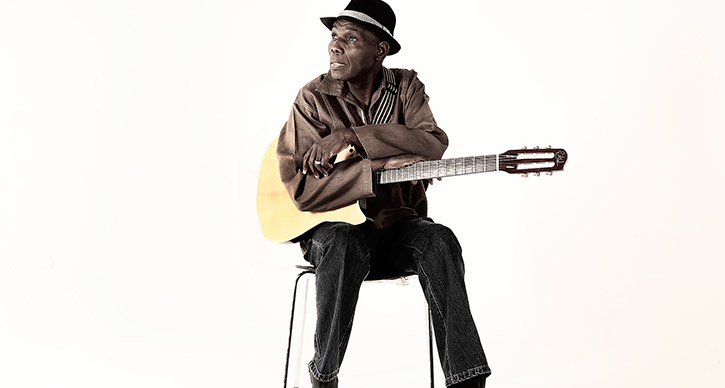UMS Playlist: Social Change and African Popular Music
This post is a part of a series of playlists curated by UMS staff, artists, and community. Check out more music here.

Oliver Mtukudzi. Photo courtesy of the artist.
Zimbabwe’s Afropop legend Oliver Mtukudzi performs in Ann Arbor on April 17, 2015.
“Tuku” has created 61 solo albums to date, many of which focus on political and social themes. His band The Black Spirits got its start performing songs protesting the white colonial rule of Zimbabwe in the 1960s and 70s.
Throughout his career, Tuku has refrained from direct political criticism, instead using metaphor to communicate his ideas: “The beauty of the Shona language is that it is endowed with all those rich idioms and metaphor…and the beauty of art is that you can use the power of language to craft particular meaning without necessarily giving it away. So, I used the beauty of Shona to communicate in my own way and people got the message.”
Themes of social change are common in popular African music. In this listening guide, explore some of the history of this connection.
1. Nelson Mandela commissioned the group “Sipho Hotstix Mabuse” to write a campaign theme song for his bid to be South Africa’s first democratically elected president in 1994. Simply titled “Nelson Mandela,” the song speaks frankly about the Mandela’s hopes to promote unity in the country.
2. Angelique Kidjo (who last performed in Ann Arbor in 2013) blends musical traditions from her native Benin with Western popular music, singing in English as well as her childhood languages of Fon and Yoruba. Many of her songs include themes of peace, tolerance, and liberation. In “Kulumbu,” Kidjo speaks about the nececsity for women to participate in conflict resolution after suffering disproportionately during war.
3. The title of Bassekou Kouyate’s song “Jama Ko” translates to “the gathering,” and urges for peace and reconciliation in Mali. Bassekou Kouyate last performed in Ann Arbor as part of our 2013-2014 season.
4. Tuku’s song “Wasakara” describes the corruption and violence of the government of Zimbabwean president Robert Mugabe. He sings, “Admit it, you are wrinkled/You are worn out.”
5. Thomas Mampfuno also criticizes the government in “Mamvemve,” with the lyrics “the country you used to cry for is now in tatters.” Zimbabwe’s political environment is so restrictive that Mampfuno has not visited the country since 2004.
6. In “Ndakuvara,” Mugabe is represented by an ox too stubborn to learn from its elders. Through metaphor, Tuku writes protest as subtext subtle enough to allow him to remain in Zimbabwe.
What did you think about this playlist? What songs would you add?





